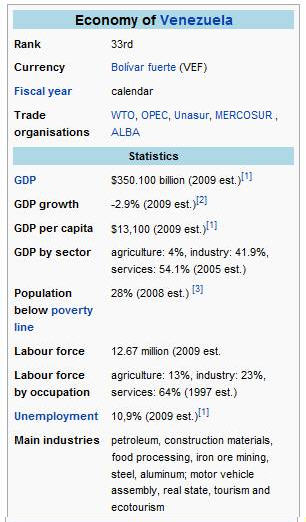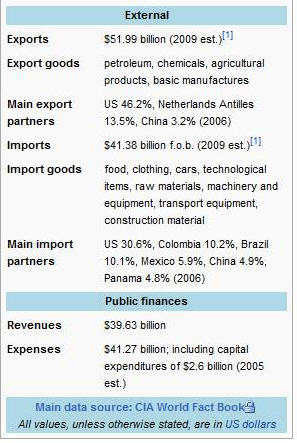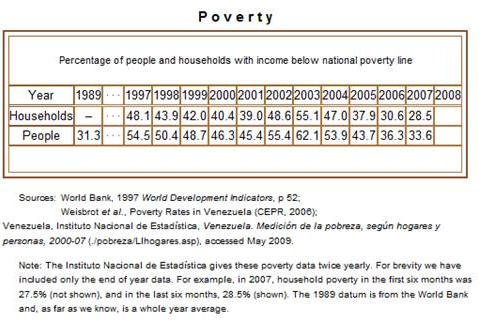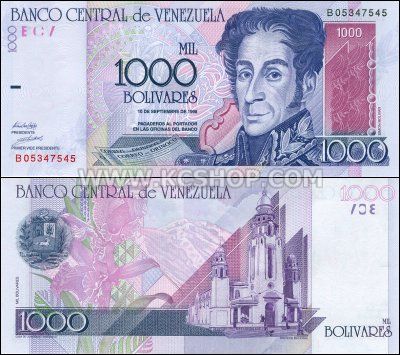|
Networked Economy
►Economy
Overview
■
Currency Market
■
Info
Technology
Economy Overview
Accounting for roughly
90% of revenues from export earnings, Venezuela remains highly
dependent on the oil industry.
From late 2002 to early 2003 a nationwide strike had far-reaching
economic
consequences where GDP declined over 8%.
Since then economic output has recovered strongly. Motivated by
high oil prices, record
government spending helped to boost GDP between 5 and 10% between
2006
and 2008 just before the world recession caused a contraction in
2009.
With a costly effect of
higher inflation (roughly 20% in 2007 and more than 30% in
2008) - the government spending, combined with recent minimum
wage hikes and
improved access to domestic credit, has created a consumption boom.
Imports also jumped significantly before the recession of 2009 and
Declining oil prices
in the latter part of 2008 are undermining the government's ability
to continue the high
rate of spending.
With continued efforts to
increase the governments control of the economy, in 2007,
President Hugo Chavez nationalized firms in the petroleum,
communications, and
electricity sectors.
In 2008-09 he also nationalized firms in the agribusiness, banking,
tourism, oil, cement,
and steel sectors as well. By January, 2010, CHAVEZ announced a dual
exchange rate
system for the fixed rate bolivar.
The system offers a 2.6
bolivar per dollar rate for imports of essentials, including food,
medicine, and industrial machinery, and a 4.3 bolivar per dollar
rate for imports of other
products, including cars and telephones.
back to top


back to top

With over 2,500
Venezuelans livelihoods at risk as a result of a government
crackdown
on the unregulated currency market, President Hugo Chavez has
accused bond and
currency traders of undermining the country’s currency, the bolivar,
as well as aiding
capital flight and money laundering.
According to CNV,
Venezuela’s brokerage industry boomed between 2005 and 2010,
growing 42% to more than 100 firms. With such an inadvertent
consequence of
currency controls imposed by Chavez, this industry soared.
However, for the past 9 months, Venezuela’s securities regulator,
known as CNV, has
taken control of about 40 brokerage firms and closed down four.
On May 24, 2010 the
largest invested brokerage firm was Econoinvest Casa de Bolsa
had its offices raided and four of its directors arrested.
Overall, "the government aims to cut the number of brokerages to
fewer than 20 in a
bid to keep the bolivar from depreciating".
back to top
“Venezuela's near-term economic outlook is
challenging for IT spending, with the
increasingly consumer driven growth of recent years cooling due to
economic uncertainty
and lower oil prices.
However, there will continue to be areas of opportunity, and we
project that IT spending will grow from US$1.6bn in 2010 to around
US$2.3bn by
2014.”
Currently, wireless telecommunications are
growing significantly in Venezuela. "Minoru
Itaya, president of Sony Ericsson in Latin America, singles out
Venezuela (along with
Brazil) as the company's top growth markets in the region.
‘The rapid-growing markets of Brazil and Venezuela are putting a lot
of focus on
these two markets,’ he tells Latin Business Chronicle.”
“Venezuela is the fastest-growing market in
Latin America for wireless
telecommunications using GSM technology, according to Erasmo Rojas,
director
of Latin America and the Caribbean for 3G Americas, an industry
group promoting
GSM.”
back to top
References
- Click here
back to top |




